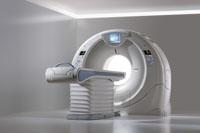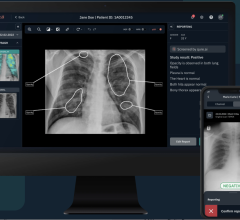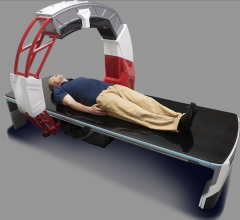
Toshiba’s Aquilion One enables dynamic imaging of an entire organ, resulting in the ability to reduce diagnosis time from hours or days to minutes. The system covers up to 16 cm of anatomy using 320 ultra-high resolution, 0.5 mm detector elements to image an entire organ, including the brain or heart, in a single rotation, enabling rapid and accurate diagnosis when time is critical.
Aquilion Premium
Toshiba’s Aquilion Premium computed tomography (CT) system is designed to not only improve clinical accuracy but also make procedures safer and more efficient while increasing patient comfort and operator convenience. It includes 160 detector rows to image up to 8 cm of anatomy in a single gantry rotation (as fast as 0.35 seconds). The system is also field-upgradeable to 320 detector rows. Aquilion Premium features a 660-lb. patient weight couch to accommodate larger patients; front and (optional) rear table footswitches to facilitate workflow; and a single push button enabling the gantry and couch to return to the home position automatically. The system also features ultra-helical scanning, which is a 160-detector row scan mode that can image the entire chest, abdomen and pelvis in seconds. Ultra-helical scanning produces significantly less motion artifact and provides clinicians with high-quality images for accurate diagnosis, which can lead to improved workflow for facilities by allowing them to complete exams more quickly and accurately. Additionally, it is ideal for patients who have difficulty staying still during exams, such as trauma patients.
Toshiba Demonstrates Effectiveness of Dynamic Volume CT
Toshiba America Medical Systems, Inc. will demonstrate the effectiveness of the Aquilion One dynamic volume CT in diagnosing acute stroke and chest pain and improving patient outcomes while achieving cost efficiencies.
As an example, world-class stroke care center Millard Fillmore Circle Gates Hospital in Buffalo, N.Y., conducted a non-controlled study measuring the economic impact that 320-detector row CT had on the diagnostic workup of patients presenting with symptoms of acute stroke and transient ischemic attack (TIA). Millard Fillmore found a reduction in hospital stay, had more patients discharged to home and achieved an approximate annualized savings of more than $750,000.
Toshiba Showcases Advanced Dose Reduction Technology – AIDR 3-D
Toshiba America Medical Systems, Inc. will showcase the next generation of dose reduction technology – Adaptive Iterative Dose Reduction 3-D (AIDR 3-D – a work in progress). Compared with conventional scanning, the advanced software lowers the radiation dose to the patient while maintaining image quality.


 August 09, 2024
August 09, 2024 








